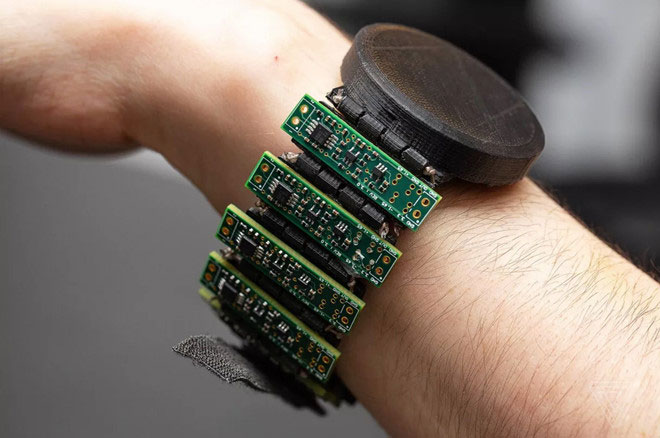The device helps Facebook read users' brains
This is just one of Facebook's efforts to decipher how the human brain works.
Facebook has just announced the acquisition of CTRL-Labs, a startup that develops communication devices between the brain and a computer. This could be an important step for the company to aim to "read" the user's brain.
According to Bloomberg, Facebook may have spent up to $ 1 billion to acquire CTRL-Labs . It became one of Facebook's biggest deals, and the biggest hardware deal after it bought Oculus for $ 2 billion in 2014.

Wristbands for reading gesture signals from the human brain developed by CTRL-Labs.(Photo: The Verge).
"The vision of this project is to create a bracelet that allows the user to control the device with natural gestures. The spinal neurons will send signals from the brain to the muscles on the hands, out." The device will decode those signals and convert them into a digital signal that the device can understand, allowing you to control your digital life.
The bracelet can capture the user's intent, so you can share the photo with a small gesture, or just think about it, " explains Andrew Bosworth, director of hardware at Facebook.
The operation of CTRL-Labs sounds very promising, because it can help control virtual reality devices VR, AR simpler. However, many analysts believe that Facebook's own brand may affect the product that CTRL-Labs is developing.
"The problem is that the technology that CTRL-Labs is working on might not make sense when Facebook owns them instead of anyone else. In fact this is also an Oculus problem: Facebook's money is very useful, but their brand is also notoriously, " commented Stratechery's analyst Ben Thompson.
This is not Facebook's only attempt to study how the brain works. In July, the company announced it would work with researchers at the University of California to create communication devices that help decode signals in the brain from talking.
- Device to read thoughts in the human brain
- Breakthrough application from human mind reading chip device
- Facebook is collecting data from everyone, even when not logged in
- 12 extensions that people addicted to Facebook need to have
- Equipment can 'read the wall' to think animals
- Read newspapers directly from Facebook's News Feed
- Surprise with 10 exciting new features of Facebook Messenger
- Facebook has 500 million users
- Instructions on how to change the flat interface for Facebook on your computer
- Reading novels will help the brain develop
- 15 interesting things about Facebook you may not know yet
- How to capture and share 360-degree photos on Facebook?
- Facebook helps older people become more alert
- Using Facebook a lot will cause severe stress
 The US company is about to build a supersonic passenger plane of 6,000km / h
The US company is about to build a supersonic passenger plane of 6,000km / h Japan develops avatar robot as in fiction film
Japan develops avatar robot as in fiction film Australia tested the world's first mango picking robot
Australia tested the world's first mango picking robot Finland installs the world's first sand cell system
Finland installs the world's first sand cell system